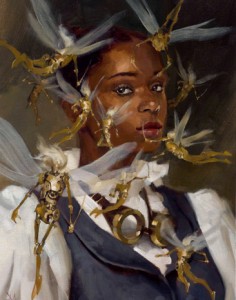
I found some pieces of my speech illustrated on Twitter, which was nifty. Here’s one Joyelle Brandt put up.
(after a little banter about muffins) I would ask you all if you’re having a good time but I know that you are. Because I’ve been so impressed by the enthusiasm, the professionalism, and the talent here, and amazed at how well the presenters are taken care of by the conference. Thank you for the chance to be here.
I figure you are all already stuffed full of writing advice, so I wanted to give you some things for after the conference.
First off, go home and sleep. Decompress. You’ve been working hard all weekend and you deserve it.
Then start to work. If you’re a notetaker, go back over your notes. I still go over mine from Clarion West in 2005 every once in a while. If you’re not, go look to see what other people have written up. I guarantee you’ll find some blog write-ups and other notes. Go find what you might have missed.
And use those notes and ideas to start to write. I try to write, every day, 2000 words, because that’s what Stephen King does and I think he’s a pretty good role model. Note that I say try, because I don’t always hit it. But you must write. Every day you write is a victory.
Figure out your personal writing process and what works for you. And then do it, lots. I realized that my most productive time is the mornings. So if my mother calls in the mornings, she knows I will answer “Is this an emergency?” and if she says no, I will hang up. (I did warn her before implementing this policy.) Find the times and places you are productive and defend them from the world. You will have gotten a lot of writing advice here and the thing about writing advice is this. All of it is both right and wrong, because people’s process differs and moreover, it can and will differ over the course of time. Find what works for you and do it.
Be kind to yourself. We are delicate, complex machines both physically and mentally. Writers are so good at beating themselves up, at feeling guilty, at imagining terrible futures. You are the person with the most to gain from being kind to yourself; do it. Don’t punish yourself for not hitting a writing goal; reward yourself when you do.
Seek out the peers who encourage and stimulate you. If you exist in an isolated place, there is the Internet. For example, sometimes Mary Robinette Kowal opens up a Google Hangout and invites some people and we all write together, simultaneously alone at our desks across the world and yet in each other’s company.
Read both in your genre and outside it, and remember that you cannot write anything better than the best stuff that you’re reading. Don’t let being a writer spoil your pleasure in reading. That would be a terrible thing. Instead, read for pleasure and then, when you find a book that you either love or hate, go back and reread it to figure out why. If there’s something a writer does that you think is nifty, steal it and use it. That’s absolutely valid. That’s how writers learn.
Persistence is important, as important as talent. Here’s an example for you. I had a story come out this year in The Magazine of Fantasy and Science Fiction, a short story called “Red in Tooth and Cog.” It was my 44th submission to the magazine. And it wasn’t that the other 43 stories were bad stories – they all went on to find good homes and a few got award-nominated – but that they weren’t right for the magazine at that particular time. You must be persistent.
Volunteer if you have the time and resources — but with a plan. It’s a good way to be engaged with the larger community. One of the things I tell my students is to do some slush reading for a magazine. It’s a great way to get a feel for the editor’s side of things and to realize what the submission pile is like. Because one of the things you’ll learn is that no editor, or agent, or publisher says “Send me something” to be kind. There are just too many submissions flying at them on a daily basis for anyone to say that and not mean it. So if someone tells you that, do it, and do it sooner rather than later. You can learn a lot volunteering as a slush reader; just don’t do it too long or it will kill your soul.
Or volunteer with a conference like this one. You’ve seen what an enthusiastic and pleasant crew they are to work with over the course of this weekend. But only volunteer with one thing, and use it to deflect other requests. That’s what I do with SFWA, because I am sinking plenty of time into that, and I simply cannot take on other things. You must learn how to say no to things in order to survive as a writer.
But this brings me to the most important part. Writers live double lives. Many of you will have had that weird moment when the internal narrator first manifested and your life acquired a voiceover along the lines of, “She went to the cupboard and opened the door. She took down the cinnamon. Sprinkling it over the coffee, she inhaled. Etc.” We live and we watch ourselves living.
It is not enough simply to witness, to be such watchers. We must also act. Writers must be not just reporters, but leaders. To write about a character trying to do their best, you must do so yourself.
This weekend the question of diversity and how to achieve it has been raised over and over again. It’s so encouraging to have this fact acknowledged: diversity is not a trend. It’s a way of moving towards a more honest reflection of reality.
These are times when empty and inflammatory rhetoric increasingly dominates the public discourse. These are times when the repetition of mistruths to make them truths is a strategy exercised over and over again. These are times when we have a wealth of dishonest words.
We are the counter to that.
Because as writers, we write the truth of what it is to be a self-aware, self-directed creature in a universe that feels cold, hostile, and even downright unfair at times. Every story has that core. Whether it’s about wizards, spaceships, cowpokes, serial killers, whatever. We let our readers lead alternate lives and learn something about themselves in the process.
What does that mean for us as writers, as part of that grand and illuminating tradition? That we must live bravely and unflinchingly, knowing that we are imperfect creatures that can win only for the moment, if that. That we must speak our truths, the ones we have come to, honestly and fearlessly, knowing that sometimes — perhaps even often — we will be misunderstood. That we must throw ourselves into the abyss and spread our wings, trusting that we will fly.
Because we will. You will. I will. And in doing so, we will create the stories that lift our fellows upwards.
So go home. Sleep. And then when you are ready, spread your wings and begin to fly.





